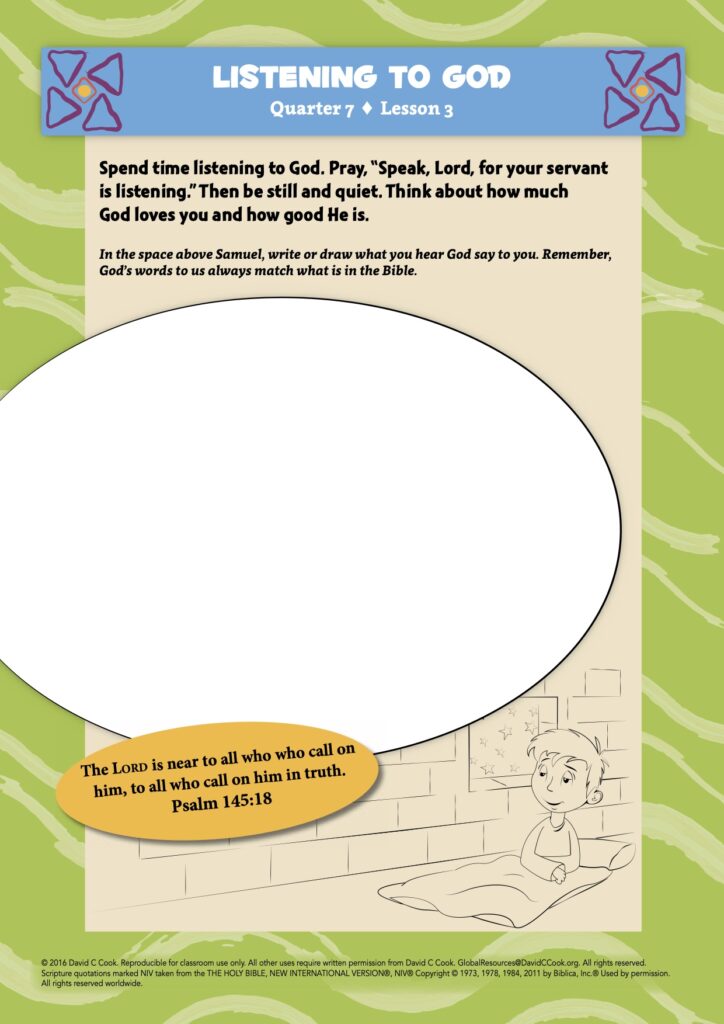During the lesson, the information for you to know is written in regular type, and what we suggest speaking or reading aloud to children is in bold. All resources for this lesson, including the Teacher Guide, Student Page, Family Connection Card, and other resources can be downloaded in a ZIP file by clicking on the following link:
In some lessons you will find "resource articles." These are articles written by experts from around the world to help equip you for your work with children and adolescents. Share them with parents or guardians if you consider it appropriate.
The Lord is near to all who call on him, to all who call on him in truth.
Psalm 145:18
When we spend time listening to a friend, we draw nearer to her. We get to know what she likes and does not like. We understand her feelings and personality. Our friendship with her grows deeper. The same is true in our relationship with God. Through Jesus, He has called us friends (John 15:15). We draw nearer to Him when we listen to His voice.
God spoke to young Samuel 3 times before Samuel realized it was God. When God called Samuel’s name the fourth time, the boy responded, “Speak, for your servant is listening” (1 Samuel 3:10). And God spoke. This week, spend time each day listening to God in prayer. Like Samuel, invite God to speak. Then be still and pay attention. Finally, remember that when God speaks, His words always match the truths He reveals in the Bible.
Let the families know that children are learning about listening to God in prayer. Encourage them to practice listening well by taking turns as each person shares about the best and worst parts of his day.
Teacher Tip: If possible, email or text the Family Connection Card to the families of your students.
Welcome your children warmly as they arrive. Call them by name and tell them you are happy they are in class today. Let them know that today they will learn more about listening to God.
Allow children to share their ideas. Some ideas are interrupting when the other person is talking, looking the other way, laughing, and not paying attention.
Have the children find partners. One child will be the “talker” and the other will be the “bad listener.” Explain that you will give the talker about 1 minute to tell the bad listener about his day. As he talks, the bad listener should do some of the things that bad listeners do. After a minute, have the partners switch roles. Then gather everyone together.
Pay attention, remain quiet, look toward the person talking. (These may vary depending on what is normal in your community.)
Today we will hear about a boy in the Bible who learned to listen well when God spoke to him. Then we will learn some tips for listening to God like the boy in the story did.
Samuel was only about 3 years old when his mother brought him to the priest Eli in the tabernacle. His mother, Hannah, told Eli, “I prayed for this child. The Lord answered my prayer, and I had a baby. Now I am giving him back to God. From now on Samuel will live here with you and serve in the house of the Lord.”
We can only imagine what Samuel must have felt when his mother said good-bye. Maybe he was angry. Maybe he was afraid. Maybe he cried. Or maybe he tried to be brave. Maybe he felt just like you have felt sometimes.
As Samuel grew up, Eli taught him how to serve in the Lord’s house. One night Samuel was lying down to sleep when he suddenly heard someone call his name. Eli was sleeping nearby, so Samuel ran to him.
“Here I am! You called me?”
“I did not call you,” Eli said. “Go back and lie down.”
Samuel did as he was told. But before he could fall asleep, the same thing happened again. He heard a voice call his name, “Samuel!”
So Samuel got up and went back to Eli. “Here I am; you called me.”
But Eli had not called Samuel this time, either. “Go back and lie down,” he told him.
So Samuel went back and lay down again. And the same thing happened again! A voice called his name, “Samuel!”
And what do you think Samuel did? He went back again to Eli and said, “Here I am. You called me.”
But this time Eli figured out what was happening. It was God calling Samuel! God was trying to get Samuel’s attention. God wanted to say something to Samuel.
So Eli told Samuel, “Go and lie down, and if He calls you, say, ‘Speak, Lord, for your servant is listening.’” Of course Samuel did exactly what Eli told him to do.
Before long, the voice came again. Only this time, Samuel knew what to do. He replied, “Speak, for your servant is listening.”
What happened next is truly amazing. God actually spoke to Samuel. God told him some incredible things. Very important things! Samuel was probably about 12 years old by now. God trusted him with a very important message!
But the story does not end there. From that night on, God continued to speak to Samuel. God was with him as he grew up, and God gave him great favour. We can imagine that Samuel no longer felt alone because God Himself had chosen to come near to him and speak with him.
Optional: If you are using The Action Bible, allow the children to quickly review this story on pages 248–250.

Encourage the children to talk about the story.
Read Psalm 145:18 to the children, if possible from your Bible. Encourage them to listen carefully to what this verse says about God and prayer.
Show the Memory Verse poster if you are using it.
The Lord is near to all who call on him, to all who call on him in truth.
Psalm 145:18

Sometimes God speaks to us without our asking Him anything. But a listening prayer often means we ask Him a question and listen for His answer. This is a wonderful way to hear from Him. You can be ready for Him if you learn some things from Samuel.
Let the children give their answers. After they respond, use the points below to help them understand the important parts about how Samuel was able to hear from God.
At first Samuel did not know that God was trying to get his attention. But he knew something unusual was going on. Samuel did not ignore what was happening or give up just because he did not understand. He was alert, and he paid attention.
Sometimes God will try to get your attention by repeating the same words or ideas to you over and over, often in different ways. For example, you might dream about a friend one night. Then, the next morning, you might see her picture. Later in the day, you remember something funny she said. God might be trying to get your attention. He may want you to pray for her. Remember that when God speaks, His message always matches what is in the Bible, which is His Word.
Did you notice that Samuel first heard from God when he was being completely quiet? It was nighttime. He was quiet and lying still. It is not unusual for God to speak to you when you are quiet and still.
Sometimes we cannot hear God because we are always talking, distracted, or busy. If you want to hear from God, be sure to allow for a few quiet minutes in your day. For example, you might take a few minutes to sit quietly and think about how much God loves you or how good He is. Sometimes God will say something to you during this quiet time. Other times it will just be quiet. That is okay.
You can use the same prayer Samuel did, “Speak, Lord, for your servant is listening.” When you pray this prayer regularly, you let God know that you really want Him to talk to you. This is a way to draw near to God.
Let’s try this right now. When you are ready, pray silently, “Speak, Lord, for your servant is listening.” Then be quiet and still. Think about how much God loves you and how good He is.
If possible, have the children spread out. Give them time to be quiet and still. Hush any who are whispering or giggling. Allow the children to be quiet for a few minutes.
Remember that God often speaks to us in our hearts and minds. He does not often use a voice we can hear with our physical ears. He often speaks to us through the thoughts He puts in our hearts and minds. Do any pictures or thoughts come to mind? Bible verses or stories? Songs? Any of these could be God speaking to you.
We must always remember that God only speaks truth to us, truth that matches what is in the Bible. If you hear or think something that does not match what God shows us in the Bible, it is not God speaking. If you are not sure, come talk to me or another older Christian about it.
Optional: If you are using Student Pages, there is space for the children to write or draw what they hear as they listen to God in prayer.

After a few minutes, ask the children if they sensed God speaking to them. Assure them that it is okay if they did not hear anything this time. Allow a couple children to share what they believe God said to them. Explain that God often speaks words to one person that can encourage others as well. If a child shares something that does not match the truth of Scripture, remind the class that God’s words always match what is in the Bible.
Close by speaking this blessing based on Psalm 145:18 over the children:
Blessing: The Lord is near to all who call on Him in truth. May God speak wonderful words of truth to you as you learn to listen to His voice.
Lead the children in singing this quarter’s song, if possible.
Life on Life ©2020 David C Cook. Reproducible for home or classroom use only. All other uses require written permission from David C Cook [email protected]. All rights reserved.